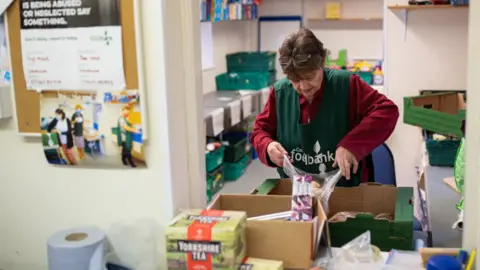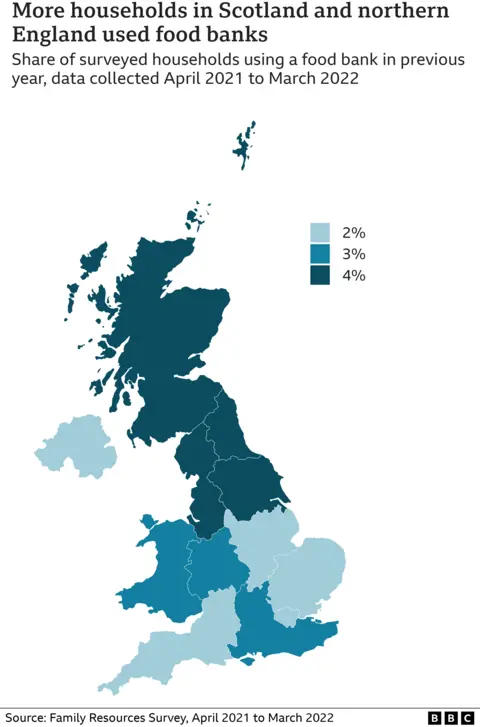Cost of living: Food banks used by 3% of UK families
 Getty Images
Getty ImagesAbout 3% of families in the UK - at least 2.1 million people - used a food bank in the year to March 2022, according to official figures.
That rose to about one in nine (11%) for families receiving state income-related benefits.
Those in the north of England and Scotland were most likely to have used a food bank in the previous 12 months compared to the rest of the UK.
These are the first Department for Work and Pensions figures on food bank use.
The data was collected between April 2021 and March 2022, with people asked if they had been to a food bank in the last 12 months and last 30 days. So the figures cover some of the pandemic but miss most of the energy price crisis, which hit in April 2022.
It comes amid the continuing cost-of-living crisis, with prices rising more than expected, according to new inflation figures released this week.
Asked if they had used a food bank within the last 30 days, about 1% of families (at least 600,000 people) said yes - rising to about 3% for families on benefits.
Some 4% of families in Scotland and the north of England had used a food bank within the 12-month period, while 3% had in Wales, the West Midlands and south-east of England.
The figure fell to 2% for Northern Ireland, the East of England, East Midlands and south-west of England.
While the official figures only show food bank use up to early last year, statistics from food poverty charity the Trussell Trust have shown an increase in usage between April 2022 and September 2022, up to just above the levels seen at the start of the pandemic.
Between 1 April 2022 and 30 September 2022, food banks in the charity's UK-wide network distributed almost 1.3 million food parcels - a rise of 52% compared to the same period to September 2019.
Heather Buckingham, director of policy and research at the Trussell Trust, told BBC News the figures were "deeply concerning" but "sadly not surprising".
She called on politicians to guarantee that the basic rate of Universal Credit was calculated so it would always at least cover the cost of essentials.
A single person receiving Universal Credit gets £35 a week short of the amount the charity thinks is needed to afford the very basic essentials, she said.
Households where there were people with disabilities and single-parent families were overrepresented among those needing to use food banks, she added.


Food banks receive donated non-perishable food and other essential items which volunteers then sort into parcels which can be given to those in need.
Care professionals such as health visitors, school staff and social workers can identify people who need support and issue them with a food bank voucher so they can collect a food package.
Other figures published by the DWP showed the number of people living in poverty in the UK has almost returned to pre-pandemic levels.
In total, 14.4 million people were estimated to be in relative low-income households - with below 60% of average household income - in the year to March 2022, up from the 13.4 million in March 2021 and close to the 14.5 million the year before, as the Covid pandemic hit.
Some 4.2 million children were estimated to be living in poverty in the year to March 2022, a rise from 3.9 million the previous year and just below the 4.3 million in March 2020.
Becca Lyon, head of child poverty at Save the Children UK, said the "grim figures" proved families were "still very much in the depths of a crisis".
"Families need a proper benefits system that protects them from hardship, and means children can grow up without having to know what the inside of a food bank looks like," she said.

Barnado's chief executive Lynn Perry said the number of children in poverty was "unacceptable" for the sixth largest economy in the world and wants free school meals extended to all primary school children in England.
Action for Children accused ministers of knowing how to help, due to the action taken during the pandemic, but "choosing not to do it".
Andrew Forsey, national director of Feeding Britain, called for the government to reduce the rate of monthly deductions from Universal Credit - made to repay debts - describing them as a poverty tax.
A government spokeswoman said it was committed to "eradicating poverty and supporting those in need", adding there were nearly two million fewer people in absolute poverty than there were in 2009/10.
"These latest figures reflect the country coming out of the pandemic and accompanying rising prices, which we have since helped to address with record levels of support via cost of living payments to over eight million households, and plans to provide up to £1,350 of direct payments for the most vulnerable over this year and next," she said.

Does your family use a food bank? How are you coping with the rising cost of living? Share your experiences by emailing [email protected].
Please include a contact number if you are willing to speak to a BBC journalist. You can also get in touch in the following ways:
- WhatsApp: +44 7756 165803
- Tweet: @BBC_HaveYourSay
- Upload pictures or video
- Please read our terms & conditions and privacy policy
If you are reading this page and can't see the form you will need to visit the mobile version of the BBC website to submit your question or comment or you can email us at [email protected]. Please include your name, age and location with any submission.
